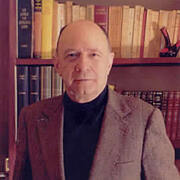Jacques Ellul (1912–1994)
Author of The Technological Society
About the Author
Jacques Ellul, historian, theologian, and sociologist, is one of the foremost and widely known contemporary critics of modern technological society. Born in Bordeaux, France, Ellul received a doctorate in the history of law and social science in 1936 from the University of Bordeaux. In 1947 he was show more appointed professor of social history at the University of Bordeaux, remaining there until his retirement in 1980. Although influenced strongly by his early reading of the Bible Marx, Ellul has been unable to synthesize Marxist doctrine with Christianity. These readings and experiences have influenced his later philosophy and writing. Ellul has taught and written extensively in his areas of specialization - Roman law, the history and sociology of institutions, Marxism, propaganda, and technique in society. He also served in the French Resistance during World War II, worked as a lay pastor, and has been active with various theological organizations, including the World Council of Churches. In addition, Ellul has been active in the environmental movement and has worked to prevent juvenile delinquency and violence. Since 1969, he has been editor of Foi et Vie (Faith and Life). Although retired as a teacher, Ellul has continued writing. One of his writing projects is an autobiography to be published after his death. Ellul has provided a sociopolitical as well as a theological analysis of contemporary society in more than 40 books and 800 articles. The Technological Society (1954) established Ellul as a social critic. The book has had a major impact on the collective consciousness of a society just beginning to recognize the central role and force of technology. Here Ellul develops the notion of "technique," a concept much broader than technology: "Technique is the totality of methods rationally arrived at." In Ellul's view, technology in this sense tends to become all-encompassing. His subsequent books, especially The Political Illusion (1965) and Propaganda (1962), further develop and refine elements of this central theme. This "trilogy" of books reflects Ellul's desire to alert readers to the dangers of technological determinism and thereby help them transcend it. Because of a dialectical approach separating his sociopolitical and theological studies, Ellul has often been criticized as overly pessimistic in his sociologically based writings. His theological works, however, provide a more positive perspective and counterpoint to his sociological work. Most notable are The Politics of God and the Politics of Man (1966), The Meaning of the City (1970), and especially The Ethics of Freedom (1973). The main body of Ellul's sociopolitical critique of technical society is reflected by The Technological Society, The Political Illusion, Propaganda, and The Technological System. Among his other works are Autopsy of Revolution (1969), which questions what kind of revolution is realistically possible, The Humiliation of the Word (1981), which expands upon the concept of "human techniques", and The Technological Bluff (1990), which discusses the state of contemporary society, especially in regard to such technologies as computers and genetic engineering and the progressive "discourse" that surrounds their societal incorporation. (Bowker Author Biography) show less
Image credit: used by permission ©AIJE
Works by Jacques Ellul
Jacques Ellul on Politics, Technology, and Christianity: Conversations with Patrick Troude-Chastenet (2005) 10 copies
La Pensée marxiste : Cours professé à l'Institut d'études politiques de Bordeaux de 1947 à 1979 (2003) 9 copies
Les successeurs de Marx: Cours professé à l'Institut d'études politiques de Bordeaux (2007) 5 copies
Le bluff technologique: Préface de Jean-Luc Porquet de Jacques Ellul (11 janvier 2012) Poche (1600) 3 copies
A técnica e o desafio do século 2 copies
Desert, Wilderness, Wasteland, and Word: A New Essay by Jacques Ellul and Five Critical Engagements (2023) 1 copy
Staan in de wereld van nu 1 copy
Philosophie du droit 1 copy
Teknoloji Toplumu 1 copy
L'Homme et l'argent 1 copy
Het verraad van de techniek 1 copy
Il tradimento dell'Occidente 1 copy
A Palavra Humilhada 1 copy
Associated Works
Tagged
Common Knowledge
- Legal name
- Ellul, Jacques Cesar Emile
- Birthdate
- 1912-01-06
- Date of death
- 1994-05-19
- Gender
- male
- Nationality
- France
- Country (for map)
- France
- Birthplace
- Bordeaux, Gironde, Nouvelle-Aquitaine, France
- Place of death
- Pessac, Gironde, Nouvelle-Aquitaine, France
- Places of residence
- Bordeaux, Gironde, Nouvelle-Aquitaine, France
Paris, Île-de-France, France - Education
- University of Bordeaux (Ph.D|1936)
University of Paris - Occupations
- Professor of History and the Sociology of Institutions
philosopher
theologian
sociologist - Organizations
- University of Bordeaux
- Short biography
- a French philosopher, Law professor, sociologist, theologian, and Christian anarchist. He wrote several books about the "technological society", and about Christianity and politics, such as Anarchy and Christianity (1991)—arguing that anarchism and Christianity are socially following the same goal.
A philosopher who approached technology from a deterministic viewpoint, Ellul, professor at the University of Bordeaux, authored some 40 books and hundreds of articles over his lifetime, the dominant theme of which has been the threat to human freedom and Christian faith created by modern technology. His constant concern has been the emergence of a "technological tyranny" over humanity. As a philosopher and theologian, he further explored the religiosity of the technological society.
Members
Reviews
Lists
Awards
You May Also Like
Associated Authors
Statistics
- Works
- 111
- Also by
- 2
- Members
- 5,126
- Popularity
- #4,866
- Rating
- 4.2
- Reviews
- 47
- ISBNs
- 244
- Languages
- 12
- Favorited
- 16
















